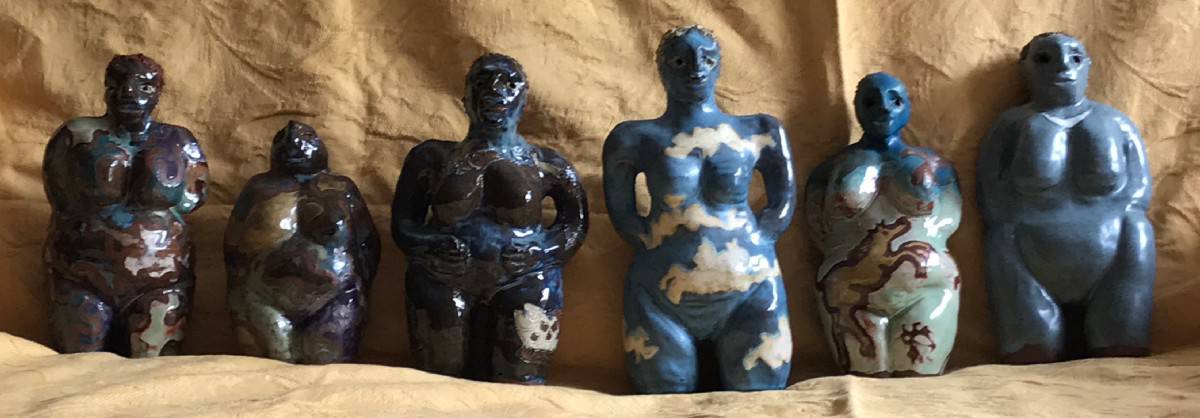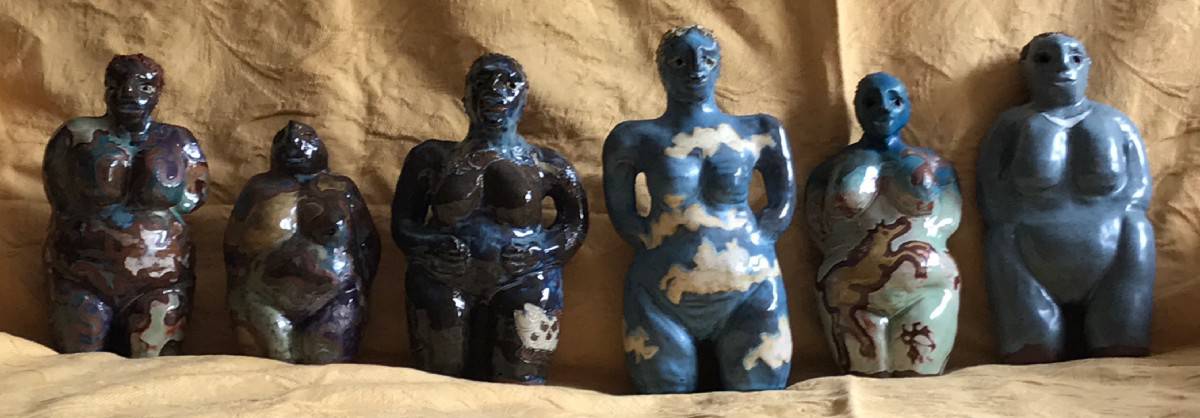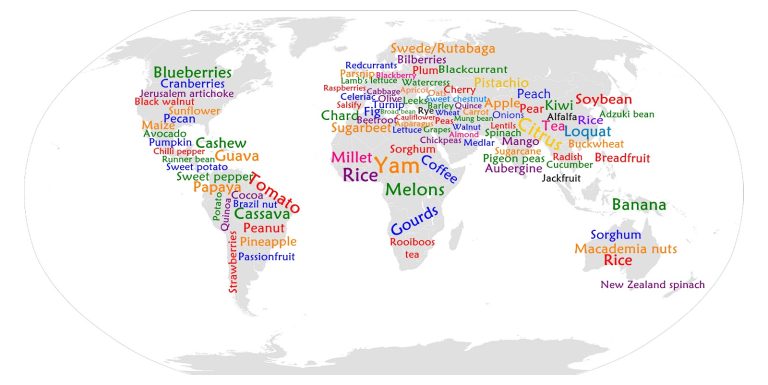Personal and world transformation with ecofeminism and permaculture.
By Dido Dunlop

Ecofeminism is commonly seen as women planting trees: just as permaculture is commonly seen as gardening. Those are the first steps.
Permaculture is a design system, based on Nature’s ecosystems. Social and spiritual permaculture design for human communities. Eg, Transition Towns.
Ecofeminism finds similar patterns, for a life different from patriarchy.
Short video: Dido Dunlop introducing this
Women and the Earth
Ecofeminism adds that patriarchy devalues women, and therefore devalues nature, because nature is seen as mother. Women and nature get trashed together. Anything patriarchy associates with women is also trashed: caring, compassion, mothering, emotions, looking after nature, valuing life over money.
To survive the climate emergency, we need to know we’re part of Mother Nature. To value nature, we must honour women too, and vice versa.
‘We are proud to be identified with nature!’
If we called it Father Nature, would we trash him? We expect Mother to look after us endlessly, without asking for care in return. She feeds us, takes away our nappies. Patriarchy throws trash on the ground; she’ll take it away!
Matriarchy is the rule of Mother Nature: the laws of nature, not the rule of women over men. Patriarchy is based on hypermasculine values. Hypermasculine is not how the world works. It’s not even healthy for men. Ecofeminism brings out women’s values that patriarchy rejects. We could all live together in a healthy harmonious way. Ecofeminism doesn’t diss men: only patriarchal behaviour.
My matriarchs in the picture express how it feels when the powers of nature flow through me.
Here’s an easy way to ‘get’ the issue: ‘Ecofeminism in a Nutshell’
Practical work to Support Women
Women are on the front line of climate emergency: they grow most of the food. The book ‘Drawdown’ says educating girls is super helpful for climate.
Working with the Feminine is Brave
Ecofeminism addresses the thorny issue of feminine values: the scariest place in our culture. Patriarchy does NOT want us to go there! It undermines the whole hierarchical structure.
This is the root of our problem. That’s where we need to go, to thoroughly and deeply transform culture.
Features of ecofeminist culture
We are part of Nature, not separate.
We look after nature. She’s our mother; we rely on her.
All creatures are precious
Egalitarian
Men and women are equal, all genders included
We honour activities and values associated with women: compassion, caring, parenting, relating, connecting, pleasure.
We operate like an ecosystem. Interdependence is the central principle.
Cooperative negotiation; consensus
Gift economy: people are important, not money
Peaceful
Mother Nature is sacred
Indigenous matriarchy
Many indigenous matriarchies still live this way, or retain some of the patterns. Women are central, they are Mother Earth herself. Men treasure their women as Mother Earth, and protect and cooperate with women.
Can we learn from this, in a non-colonising way?
Taowhywee: Nuu-sru’ Agnes Baker-Pilgrim — Siletz — Mother Earth & Water
Modern Western Ecofeminism developed in the 70’s
Marija Gimbutas saw this pattern in her archaeological work in Old Europe. patriarchy is not more than 5,000 years old. her friends developed her vision into a model for a regenerative future.
Ecofeminist Spirituality
Mother Nature is sacred. It’s not about ‘religion’. Nature feeds our soul. In nature, or a permaculture garden, we feel deeply vitalized.
Buses, concrete, coal, are all made of the same four elements. Nothing on this planet is not part of nature. So everything is sacred: cooking, nappies, sex, washing dishes. There’s no separation of mundane and sacred, dark and light.
Many ecofeminists see that sacred presence as Goddess, immanent, innate in every detail of life. The patriarchal god looks down from above, separate from nature.
Starhawk
Starhawk covers physical, social and spiritual permaculture. She leads ecofeminist earth spirituality. She teaches how to run community groups. Her novels lay out a vision of ecofeminist community.
www.Earthactivisttraining.org ; www.starhawk.org
Women caring for nature
Vandana Shiva is a protector of Seeds, and fights GMO.
Wangari Maathai and the Green Belt Movement
Climate Justice
A big majority of climate activists are women, especially school strikers. Many are from the global south. These young ecofeminists are fighting for immediate issues: climate justice; protecting land and indigenous communities; rape of women, rape of nature; activist women being murdered; that women are at the frontline of climate change and it’s not fair. They don’t want climate negotiations about money, marketing and profit.
Can we create a regenerative way of life?
Indigenous people say, don’t colonise us, find your own culture. Gimbutas offers a foundation for this. Our creative adventure is to weave together contemporary ecofeminism, permaculture, learning from indigenous matriarchy, (without colonising!) into something that works for our modern world.
If you have an indigenous background
Do you see features of matriarchal/ecofeminist culture in your culture? Please consider sharing that wisdom with us. How does it work for you?
Train yourself to see the world a different way
Values
list qualities of patriarchy you’d like to leave behind.
list values you’d like as part of healthy regenerative life.
list Mother Nature’s ways of operating. compare this with the other lists.
What would nature-based culture look like?
Relax, let your imagination fly free and bold. How could our world look?
Think ecosystems, interdependence. How do plants relate to each other in permaculture? Imagine people are plants. Imagine Mother Nature and women honoured as central. How could that work: in relationships, in social structures?
Once you’ve imagined new possibilities, you can put them into action.
What would your local community could look like?
How would we relate to each other if we felt like a community?
What could women and men be like?
Patriarchy’s idea of how men and women should behave is not healthy.
Patriarchy is the rule of hypermasculine values. Not all men.
What qualities do you associate with women and men in patriarchy?
You may find they are extremely feminine or extremely manly.
How about cooperative nature-based values?
Perhaps not hypermasculine or hyperfeminine? more in the middle?
Find these in yourself. Spot them in others. Imagine them. Other genders?
Could we all be more alive, less shut down, develop more of our potential?
International relations
Think big. Rights of nature? Ecocide laws? Women? Peace?
Inner Transformation:
Become an ecofeminist heroine
To transform culture, we need to transform inner habits, values, assumptions. Grow your ecofeminist permaculture garden within!
Notice habits that are on your leave-behind list. Can you leave them behind?
Choose from your healthy lists things to practise doing more of.
The idea alone won’t transform us. We need to feel:
What is it like to feel interdependent? We’re so used to being proudly independent.
The way I do it is, I imagine how interdependence could play out in my life. Then I see if can do what I imagine. Be a woman like that. Feel what it feels like. I experiment, try it this way, then that way.
Short video by me, demonstrating this practice
Feel your deep connection with nature
Feel your bones are made of minerals like rocks, your blood salty like ocean water, your mind like breezes, fire in your heart. Nature created you as she did the kangaroo.
Life-affirming attitude
See all your activities as ‘sacred’.
Your leadership style
All over the world people are voting for strongman leaders, who won’t help the climate emergency. Our New Zealand prime minister Jacinda Ardern gets criticized for cooperating, consulting, seeking info from others. They say she’s not a real leader. She’s leading in an ecofeminist style.
In what ways do you lead cooperatively? Empower others to lead? Consult with others?
Paint or draw
What could ecofeminist heroines and heroes feel like?
What could our world look like?
Books
Women working with nature and each other
Vandana shiva Soil not Oil; Staying Alive; Making Peace with the Earth, and other books.
Wangaari Maathai autobiography: Unbowed.
Books on indigenous cultures
Helena Norberg Hodge Ancient Futures: Ladakh
Peggy Reeves Sanday Woman at the Center
Goettner-Abendroth Matriarchal Societies
ed Goettner-Abendroth Societies of Peace: includes indigenous women writers
(These two are academic but fascinating.)
Colin Turnbull The Forest People
Modern ecofeminism
Riane Eisler: Nurturing our humanity
The Power of Partnership and other books: partnership in relationships, economics, education, pleasure.
The Chalice and the Blade: her original book on partnership and dominator models
Studebaker: Switching to Goddess: witty
Novels
Starhawk The Fifth Sacred Thing; City of Refuge
Marge Piercy Woman at the Edge of Time
Rachel O’Leary The Swan-Bone Flute
Ursula LeGuin The Dispossessed, and other books.
Spiritual Permaculture / Ecofeminism
Carol Christ She who Changes: beautiful look at Mother Nature
Starhawk Earth Path.
Dido Dunlop Storm Weathering: a Workbook for our Inner and Outer Climate: meditations to restore connection with nature.
Grief and Empowerment
Joanna Macy: Active Hope; Coming Back to Life: transform environmental grief, anger and other emotions. Great Turning.
Relevant Links and Resources
Here are some meditations I led to help with visioning
‘ “Market Solutions” Won’t Bring Climate Justice. Eco-Feminism Is an Alternative.’
Why the world needs an African ecofeminist future
Indigenous matriarchs stand together in dark times
These interview women doing interesting projects:
Eco-Grief and Ecofeminism | Heidi Hutner | TEDxSBU
I, Dido, have lived 40 years with severe chronic fatigue from pesticide poisoning. Poisoning the earth is a big ecofeminist issue.




